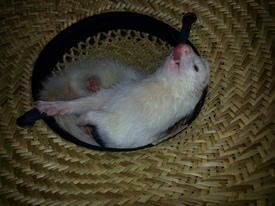PCOS and NOT eating low carb

la_vie_est_belle_
Posts: 139 Member
Hey everyone,
Am I the only PCOS-er who DOESN"T buy into the whole low carb thing? I don't eat white flour or sugar, but I definitely eat CARBS because they fuel my body. Fruit, sweet potatoes, veggies, legumes, whole wheat breads, and grains. I don't count carbs, and just stay under my calories on MFP and so far have been having pretty good success.
I'm mostly vegan so my protein is moderate (I eat moderate fats and carbs as well)
Am I the only PCOS-er who DOESN"T buy into the whole low carb thing? I don't eat white flour or sugar, but I definitely eat CARBS because they fuel my body. Fruit, sweet potatoes, veggies, legumes, whole wheat breads, and grains. I don't count carbs, and just stay under my calories on MFP and so far have been having pretty good success.
I'm mostly vegan so my protein is moderate (I eat moderate fats and carbs as well)
0
Replies
-
So are you losing weight .? Are you on any sort of medication?
I follow similar diet plan of urs ( not low carb but low gi food) . But alas no weight loss0 -
Me too, I'm not doing low carb, I'm eating low GI, plenty of veg, and moderate fruit, wholegrains and pulses. My cycles haven't got any shorter, and I'm losing some weight REALLY slowly, but I'm hanging in there. I've been doing this for four months now, will see.
I'm not taking any medication.0 -
I've honestly stopped weighing myself because I lift a lot of weights and the scale is not a useful tool when you are building muscle.
I am really liking the way that my body is shaping itself though. My clothes fit differently and i'm just feeling/looking smaller and tighter. Look at my pics if you'd like.0 -
It isn't that I don't buy into the idea that low-carb can be helpful for PCOS, it is just that I find that I don't need to be super low carb to see success. I eat mostly whole foods and aim for the 80/20 rule. I have a higher protein level with a good amount of fat so having those macros keep my carbs in check, but if I'm eating closer to TDEE it isn't uncommon that I can hit close to 200 g carbs. Most of the time I'm between 150 and 180.
I have been doing strength training (Stronglifts) and boxing recently. I also will do shorter runs (nothing much over 2 miles). I'm not at a bad weight, I'd just like to lean out by about 3% BF at this point. It will be a slow road for me (which is fine) since I'm eating to fuel my workouts instead of really focusing on the fat loss. So I'm not too far off of TDEE when it comes to my calories.
Last year I was able to drop down to about 20% BF without ever going low carb. Then life took over and I put weight back on. So I know it is possible to do it this way. May not be the most effective for others with PCOS, but I do okay with it.0 -
May not be the most effective for others with PCOS, but I do okay with it.
I think this is a big point here. We all are different, 'special snowflakes' in our own right. If it works for you, by all means do it! I advocate eating as many carbs as you can and still meet your weight/health/energy/macro goals. I cant do as many as you, I start gaining or stalling in my weight loss as I approach 100g a day, but I totally applaud those that can do it differently. Good carbs are good for you, but low GI doesn't work for some of us and it does work for others.
I have to say I'm a little jealous of your ability to eat so many carbs :laugh:0 -
Good carbs are good for you, but low GI doesn't work for some of us and it does work for others.
Totally agree, I still trying to figure out what works for me!0 -
I am conscious of my carbs but I don't restrict them. I found that when I did, I was too exhausted to lift weights and do cardio.0
-
I don't do low carb, but I can see how it works for a lot of women with PCOS. That having been said, I've lost a little over 80lbs just maintaining a calorie deficit.0
-
I focus more on staying under my calorie goal than what I'm eating. I really have to focus to make sure I get enough protein but I let the other macros fall as they may. A few months ago I tried to focus on low carb and it just led to binging on carbs or not eating because I couldn't figure out what to eat. Once I stopped that I started losing again, so I don't worry about hitting specific macros now. I do see more success losing when I eat less processed foods - I used to eat a lot, so "less" is a relative term.0
-
Low-carb isn't really a "thing to buy into" - it's a recommended method that does work well for a lot of women with PCOS - but PCOS manifests itself differently in every woman that has it. We don't all have the exact same symptoms, hormone disruptions, etc. Like others have said, that is great if you don't have to do low carb and are still able to lose weight. I'm jealous. I've found that if I continually let myself go too far over my goal of 100g of carbs/day then my weight loss slows. So for me, I guess I do "buy into the low carb thing" to a certain extent. I'm not extreme with it, but 100g/day seems to be the threshold. I have trouble staying under that goal sometimes. But when I do, it works.0
-
I can see that working I just think the crappier carbs have a worser effect like white bread potatoes junk food ( pretzels, cookies..)0
-
+1.
I know some polysisters swear by low carb and it constantly comes up when discussing diets for those with PCOS, but it's not for me personally. I feel so... Deprived. I love my carbs
That being said though I do include carbs in my diet, I have noticed that I do better staying away from certain carbs like processed carbs (ie cereals, white bread, etc) and even some healthy ones like oatmeal. I also do better without dairy. I still have those foods, but I try to stay away from it when I can.
But everyone is different and it's all about finding what works for you, low carb may work for some people -- just not for me.
Personally what's worked for me is doing Intermittent Fasting and having 2,500mg of Maca daily and I couldn't be happier 0
0 -
Low-carb isn't really a "thing to buy into" - it's a recommended method that does work well for a lot of women with PCOS - but PCOS manifests itself differently in every woman that has it. We don't all have the exact same symptoms, hormone disruptions, etc. Like others have said, that is great if you don't have to do low carb and are still able to lose weight. I'm jealous. I've found that if I continually let myself go too far over my goal of 100g of carbs/day then my weight loss slows. So for me, I guess I do "buy into the low carb thing" to a certain extent. I'm not extreme with it, but 100g/day seems to be the threshold. I have trouble staying under that goal sometimes. But when I do, it works.
Good explanation.
I've been experimenting. I did have a time about 2 years ago when I found out I had prediabetes and was having a VERY hard time losing weight (4 months of WW then 4 months of MFP and kept losing and gaining the same 2 lbs). I finally tried the Dukan diet (pretty low-carb, but also low-fat which I now know is not the best idea for PCOS). It worked for me in that I finally lost the rest of my pregnancy weight (lost 11 lbs in 5 weeks, which was amazing after 8 months of dieting with no results), reversed my prediabetes and dramatically lowered my triglycerides. My PCOS symptoms were a little bit better too.
Currently I'm seeking to lose more weight (aiming to get about 12 lbs under pre-pg weight) and following IIFYM. I was thinking I probably needed to stay under 80-100gm carbs to lose weight, but currently seem to be doing OK going up to 120 or sometimes higher. We'll see how long this lasts. I'm honestly not sure if I'm currently insulin resistant or not. I kind of assumed so because of the previous prediabetes thing (both my parents have Type II diabetes) but maybe not? I've had symptoms of hypoglycemia but it hasn't seemed to be as much of an issue the past year or two.0 -
Low-carb isn't really a "thing to buy into" - it's a recommended method that does work well for a lot of women with PCOS - but PCOS manifests itself differently in every woman that has it. We don't all have the exact same symptoms, hormone disruptions, etc. Like others have said, that is great if you don't have to do low carb and are still able to lose weight. I'm jealous. I've found that if I continually let myself go too far over my goal of 100g of carbs/day then my weight loss slows. So for me, I guess I do "buy into the low carb thing" to a certain extent. I'm not extreme with it, but 100g/day seems to be the threshold. I have trouble staying under that goal sometimes. But when I do, it works.
Totally this!0 -
For those not doing low carb and it's working, are you insulin resistant?0
-
I lift heavy weights 3x a week on low carb with no problems. In addition, I also did couch to 5k 2x a week for the last year. The whole point of low carb is that the fat IS the fuel source, instead of carbs. The good thing about Science is that it's true whether or not you buy it

But seriously, I tried EVERYTHING else first. EVERY. THING. I gained weight last year despite reasonable calorie restriction and exercise.This was before I was diagnosed with PCOS. I reduced carbs, kept my protein and calories exactly the same, and I've lost 31 more pounds since Jan. A lot of people with healthy metabolisms and endocrine systems can lose weight on calorie reduction alone. People who are not so fortunate, especially with insulin resistance, cannot.
I lost 42 lbs on my own with a 'normal' lower calorie diet. Then I hit a wall. I fought that wall for almost 2 years before I got treatment for my hormonal issues and changed my diet. For me, the old saying is true: "lifting weights doesn't make me bulky, eating cupcakes does." I agree that you should eat as many carbs as you can and still lose weight. I have to keep my net around 50. 150g/day I gain. I eat one big high carb meal a week for my glycogen, but my lifts and workouts have not suffered after the first month of carb flu.0 -
<.< I'm not cool with restricting myself certain food groups, at least not anymore, I used to refuse to eat high fat foods and dropped a bunch of weight. My replacement was eating cheerios and Trolli candy though, so idk if low carb works or not. I just stay under my calorie goal.0
-
I know I certainly felt better doing both low carb and low gi, but regardless of how I ate the only noticeable difference came through a lot of cardio. If I wasn't jogging or running for an hour+, at least 3x per week, the weight would just stick.0
-
I only eat low carb when my body forces me. In other words, when my glucose level is off balance and I am faced with eating low carb or starting medication. I definitely eat more carbs than others. My mother was a vegetarian for years so I love vegetables but unlike her I seem to need a bit of protein. As other posters have states, "Every body is different". People have to find what works for them. It sounds like you have found a great balance for you.0
-
I lift heavy weights 3x a week on low carb with no problems. In addition, I also did couch to 5k 2x a week for the last year. The whole point of low carb is that the fat IS the fuel source, instead of carbs. The good thing about Science is that it's true whether or not you buy it

But seriously, I tried EVERYTHING else first. EVERY. THING. I gained weight last year despite reasonable calorie restriction and exercise.This was before I was diagnosed with PCOS. I reduced carbs, kept my protein and calories exactly the same, and I've lost 31 more pounds since Jan. A lot of people with healthy metabolisms and endocrine systems can lose weight on calorie reduction alone. People who are not so fortunate, especially with insulin resistance, cannot.
I lost 42 lbs on my own with a 'normal' lower calorie diet. Then I hit a wall. I fought that wall for almost 2 years before I got treatment for my hormonal issues and changed my diet. For me, the old saying is true: "lifting weights doesn't make me bulky, eating cupcakes does." I agree that you should eat as many carbs as you can and still lose weight. I have to keep my net around 50. 150g/day I gain. I eat one big high carb meal a week for my glycogen, but my lifts and workouts have not suffered after the first month of carb flu.
If this science is "true" (which i don't buy because I believe that there is no one diet out there for everyone. There is also scientific "evidence" promoting just about any diet out there. It's all marketing) why was I my lowest weight when my staple was whole grains, veggies, and fruits? I beat insulin resistance with this diet. I don't really buy into the idea about one specific macro being bad. I think it's all about quantity and the quality of food (eat nutritious food) This philosophy, along with regular exercise, has kept me at a healthy bmi for 10 years. Again, this is what has worked for ME0 -
I lift heavy weights 3x a week on low carb with no problems. In addition, I also did couch to 5k 2x a week for the last year. The whole point of low carb is that the fat IS the fuel source, instead of carbs. The good thing about Science is that it's true whether or not you buy it

But seriously, I tried EVERYTHING else first. EVERY. THING. I gained weight last year despite reasonable calorie restriction and exercise.This was before I was diagnosed with PCOS. I reduced carbs, kept my protein and calories exactly the same, and I've lost 31 more pounds since Jan. A lot of people with healthy metabolisms and endocrine systems can lose weight on calorie reduction alone. People who are not so fortunate, especially with insulin resistance, cannot.
I lost 42 lbs on my own with a 'normal' lower calorie diet. Then I hit a wall. I fought that wall for almost 2 years before I got treatment for my hormonal issues and changed my diet. For me, the old saying is true: "lifting weights doesn't make me bulky, eating cupcakes does." I agree that you should eat as many carbs as you can and still lose weight. I have to keep my net around 50. 150g/day I gain. I eat one big high carb meal a week for my glycogen, but my lifts and workouts have not suffered after the first month of carb flu.
If this science is "true" (which i don't buy because I believe that there is no one diet out there for everyone. There is also scientific "evidence" promoting just about any diet out there. It's all marketing) why was I my lowest weight when my staple was whole grains, veggies, and fruits? I beat insulin resistance with this diet. I don't really buy into the idea about one specific macro being bad. I think it's all about quantity and the quality of food (eat nutritious food) This philosophy, along with regular exercise, has kept me at a healthy bmi for 10 years. Again, this is what has worked for ME
I think her mentioning of science was in response to the linebut I definitely eat CARBS because they fuel my body
On that front, the science is clear and in no way controversial -- when you reduce your carbs to the point that the body cannot rely on it as a primary source of fuel, it looks to fat for that fuel. This happens with every body. If it didn't, you wouldn't ever be able to lose weight, because your excess weight is composed of fat.
She even said that she agrees that you should eat as many carbs as you can that won't stop you from losing weight. If it's 150g, great! If it's 50g, that's fine, too.
I don't think anyone here has said that "one specific macro is bad." Everyone has said that many women with PCOS with insulin resistance do better on a low-carb/high-fat diet, because we don't generally process carbs that well. If you've found that you do well on a higher-carb diet, then great! That doesn't mean LCHF is something to "buy into," it just means you don't have to do it to manage your weight, if you don't want to.0 -
I've never bought into it either in a lot of ways. The body and especially the brain needs carbs. But the goal is to make more of my carbs from veggies/fruit or healthier lower gi grains or beans. I do my best considering a really crummy budget I have to keep. But really try to eat and cook from whole food choices and less boxed or packaged stuff.
I was watching some videos on the book The Calorie Myth and want to check it out but also in that book I take it, it describes low(er) carb eating too. But some of the things he mentioned in video he did for Microsoft research talks was just thought provoking. Once was about how the body keeps burning what its used to and for many that becomes sugar with carbs and sugar consumption. To burn fat he basically mentions getting the body to switch from wanting sugar to fat. That way when fat from consumed foods run out its goes for the fat stores. Sugar is different because we don't store sugar as sugar or something like that. I sure hope the book explains things or I can find research on it.
I know the majority of my "bad" carbs have been packaged/boxed foods or fast food. We don't eat out a lot but fast food is the cheaper option when we have to eat last minute meals or the situation comes up.0 -
I've never bought into it either in a lot of ways. The body and especially the brain needs carbs.
The body doesn't need carbs/glucose at all to function, everything except the brain can run on ketones or free fatty acids directly. The brain does need some glucose, but the body can make most of what it needs, even in the total absence of dietary carbs.
There is actually growing evidence that the brain works best on a combination of ketones and glucose, and this set of evidence has been growing for the past century, ever since the ketogenic diet was first introduced to help epileptic patients.
It basically works like this -- ketones are actually a more stable source of fuel than glucose. The body prioritizes glucose over nearly everything else, not because it's a "preferred" fuel (if it was really preferred, the body would store more than about 100g of it in the body), but because glucose is toxic in blood concentrations higher than 140mg/dL post-meal, or over 100mg/dL sustained/fasting. At these levels, it starts causing organ, nerve, and other damage to the body. Because of this, the body goes to great lengths to keep that number down (insulin has been so important that even the most basic of animals produce it). Unfortunately, the myth that you have to eat a bunch of carbs persists. The body can make the bulk of the brain's glucose needs through a process called "gluconeogenesis" (literally, glucose creation), in which it takes fat and amino acids (proteins) and creates glucose from it. This, combined with ketones, can provide the brain all the energy it needs.
Ketones are a glucose-like source of fuel that the rest of the body, and parts of the brain can use instead of glucose. It's what the body uses any time you go more than about 6 hours without eating, such as when you're sleeping, as they're a by-product of burning fat. These ketones have been shown to reduce seizures, migraines, symptoms of Alzheimer's and Parkinson's, and numerous other issues.
The common denominator in nearly everything that both the benefits of ketosis and problems of hyperglycemia?
The brain and nervous system.
If the brain and body actually needed upwards of 50% of our energy intake to come from carbohydrates, then why do the very things people say absolutely must have from diet, actually improve when that thing is all but removed? Because the body has ways of meeting the brain's needs. It's part of what has gotten us to where we are, to begin with.
The fun part is, though, is that it's not an all-or-nothing thing. You don't have to choose between 20g of carbs and 200g. You can still see benefits of lower carb eating even around 100g. It depends largely on what your needs (including non-dietary) and goals are.
Here's some info regarding the myths and facts of how the body and brain uses glucose, what happens when blood sugar is too high, and the studied benefits of ketogenic diets:
http://www.diabetesselfmanagement.com/Blog/David-Spero/glucose-how-high-is-too-high/
http://www.phlaunt.com/diabetes/14045678.php
http://diabetesupdate.blogspot.com/2008/11/myth-busting-your-brain-and-that.html
http://blogs.scientificamerican.com/mind-guest-blog/2013/10/01/the-fat-fueled-brain-unnatural-or-advantageous/
http://www.ncbi.nlm.nih.gov/pmc/articles/PMC2367001/
http://www.ncbi.nlm.nih.gov/pmc/articles/PMC3321471/
http://www.psychologytoday.com/blog/evolutionary-psychiatry/201104/your-brain-ketones
http://www.nerdfitness.com/blog/2013/06/17/everything-you-need-to-know-about-sugar/
http://www.webmd.com/diabetes/how-sugar-affects-diabetes?page=2I was watching some videos on the book The Calorie Myth and want to check it out but also in that book I take it, it describes low(er) carb eating too. But some of the things he mentioned in video he did for Microsoft research talks was just thought provoking. Once was about how the body keeps burning what its used to and for many that becomes sugar with carbs and sugar consumption. To burn fat he basically mentions getting the body to switch from wanting sugar to fat. That way when fat from consumed foods run out its goes for the fat stores. Sugar is different because we don't store sugar as sugar or something like that. I sure hope the book explains things or I can find research on it.
The author says that it's not a "low-carb" diet. In fact, he insists on at least 10 servings of non-starchy vegetables a day. It is, however, probably lower carb than what people who have been following the Standard American/Western diet are probably used to. With the amount of non-starchy vegetables that he recommends, you're probably looking at around 100-150g of carbohydrates, total.
His stance is "protein, fiber, water" as the key to maintaining health and a healthy weight, without feeling deprived. If you ensure you're getting plenty of nutrients (though lots of vegetables and good proteins), then your body will handle the weight part on its own.
I don't recall him saying anything in the book about the body burning what it's used to. In fact, he doesn't encourage much in the way of fat. His general stance of fat consumption is from "whole-food sources" -- so your fat intake should only come from the fat in the meat, coconut, nuts, or avocado (etc) that you're eating, and not from added fats/oils (even avocado or coconut oil). Personally, I found this stance a little double-standarded, as he encourages the use of protein powders and smoothies to get all your protein and vegetable servings in. If he supported the idea that "you burn what you're used to," the diet in The Calorie Myth would encourage the burning of protein, not fat.
We don't store sugar as sugar, for the most part. About 100g gets stored as glycogen (depending on demand, people who use it more can store a little more). The rest gets sent to the liver and turned into triglycerides. This is largely why people with metabolic disorder, insulin resistance, etc, are also at higher risk for cardiovascular issues. Eating a diet higher in carbohydrates than their body can handle results in elevated triglycerides and lower HDL. Even in healthy individuals going from SAD to a high-carb whole-foods based diet, triglycerides don't change, and why going to a high-fat/low-carb diet consistently produces the most marked reduction in triglycerides.
http://authoritynutrition.com/23-studies-on-low-carb-and-low-fat-diets/
http://www.ncbi.nlm.nih.gov/pubmed/98052190 -
I think her mentioning of science was in response to the linebut I definitely eat CARBS because they fuel my body
Thank you, exactly I'm glad you joined in here, you are - as usual - a wealth of knowledge in this area!
I'm glad you joined in here, you are - as usual - a wealth of knowledge in this area!
On that front, the science is clear and in no way controversial -- when you reduce your carbs to the point that the body cannot rely on it as a primary source of fuel, it looks to fat for that fuel. This happens with every body. If it didn't, you wouldn't ever be able to lose weight, because your excess weight is composed of fat.
She even said that she agrees that you should eat as many carbs as you can that won't stop you from losing weight. If it's 150g, great! If it's 50g, that's fine, too.
I don't think anyone here has said that "one specific macro is bad." Everyone has said that many women with PCOS with insulin resistance do better on a low-carb/high-fat diet, because we don't generally process carbs that well. If you've found that you do well on a higher-carb diet, then great! That doesn't mean LCHF is something to "buy into," it just means you don't have to do it to manage your weight, if you don't want to.
^^ all of this. Fat is a fuel just like Carbs - fact. Carbs affect insulin (either in someone who has insulin resistance or diabetes) more than Fat - fact. Whether or not YOU have to reduce carbs as low does not mean that is the case for everyone. It's not something you 'buy' into, it's a tool that can be utilized to help lose weight if your body reacts negatively to a higher level of carbohydrates. If you can eat more, good for you, but you'd never tell a diabetic to eat that way. Being insulin resistant is basically the same thing.
This is the way I see it: I can either reduce my carbs now, lose weight, and possibly avoid becoming diabetic OR I can eat higher carbs, not lose weight, become diabetic and have to reduce my carbs in the end anyhow.
Not everyone is on that path. Some people can lose weight and manage their insulin by overall calorie reduction. It's not fair to say everyone should be able to do it, because it's simply not true. I just wish I had learned the true benefits about the LCHF diet for our disorder a long time ago, instead of struggling needlessly and becoming frustrated. When calorie reduction no longer works, people need to know there are other options and it isn't them 'failing.' I wouldn't want anyone to become discouraged because they were convinced that LC was some kind of fad that they shouldn't buy into. I was there. It sucks.0 -
I have lost over 100 lbs with insulin resistant PCOS also on 2000 mg of Metformin. I follow a similiar diet just minus the refined carbohydrates. I do just fine with it.0
-
I have successfully been losing weight without following a low carb diet - I have been on Metformin for a while (now supposed to take 2000 mg extended release a day, but usually only do 1000 mg a day) but the weight really started to come off regularly once I started logging/using MFP regularly and staying within calorie goals. I allow myself treats (ice cream, chocolate, etc) and I have whole wheat/grain carbs rather than white (rice, pasta, bread). As long as it fits in my calorie goals, I eat it.
I just had my bloodwork done and my hormone levels are now in the high end of normal (an improvement from a year ago) so something is working (whether it's the losing weight or the metformin or both).0 -
I have really gone back and forth in terms of reducing carbs. I really love them and don't want to give them up, so if I can lose weight and eat them I'm a happy camper. That being said, it is definitely very easy for me to gain the weight back (which is what happened this past year with crazy life changes and not sticking to my workouts as I used to do) when I don't watch the carb intake. As I start this process over I'm going to try to hit my calorie goals first and be conscious of carbs without specifically counting them. If I don't see results I will reduce carbs and see if that's the trick.0
This discussion has been closed.





















